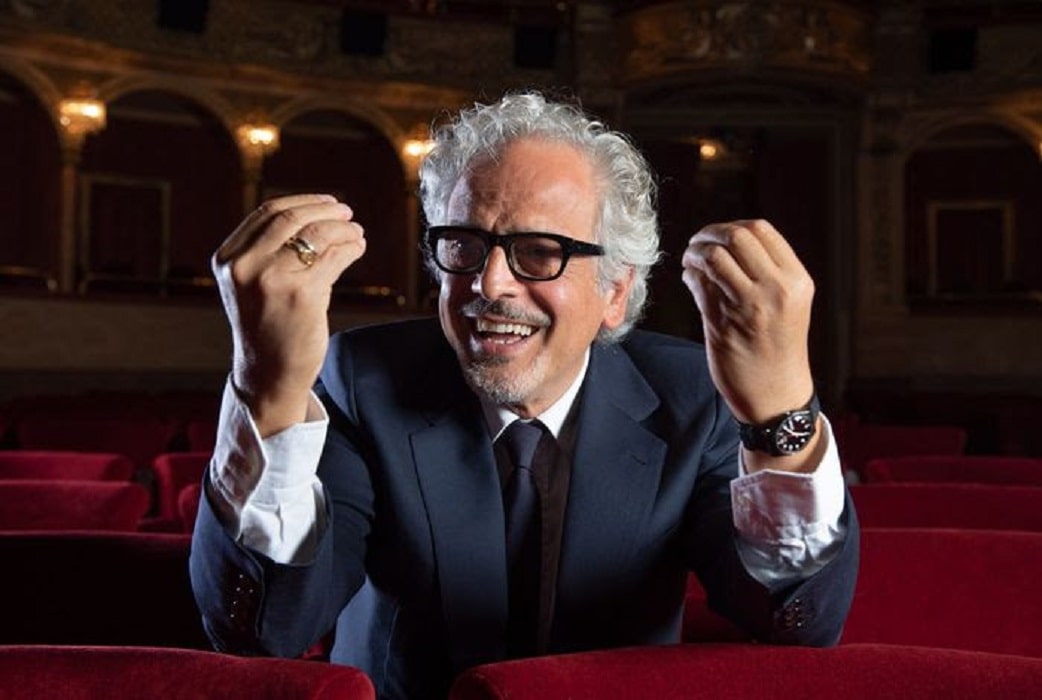With EXPERIMENTUM MUNDI, Giorgio Battistelli, as a young composer in 1981, created a sonic monument to his home town and at the same time a classic of composing with concrete everyday sounds, in which sixteen craftsmen from Albano Laziale in central Italy go about their daily work on stage. With over 400 performances worldwide, EXEPERIMENTUM MUNDI has long since become a classic of new music.
Image above: Photo: Giorgio Battistelli (c) Fabrizio Sansoni
It is a piece with and about the sounds of traditional craftsmanship and the world created with them. On 15 September, Battistelli will be awarded the Golden Lion of the Biennale di Venezia for his life’s work, and in this context the successful piece will be shown once again before it is performed shortly afterwards at the invitation of the Deutsche Oper at the Haus der Berliner Festspiele on 19 and 21 October. The musical direction is in the hands of the composer himself.
The baker cracks a few eggs and reaches for the stirring stick, a little later the cobblers start work, next come the cobblers and blacksmiths. Thus a small Italian town with its traditional crafts gradually comes to life – when Giorgio Battistelli, as conductor, gives the cues for his musical theatre work. In this one, sixteen craftsmen are on stage, all from Albano Laziale, a small town south of Rome, above Lake Albano, where the composer was also born in 1953.
This, however, with the resulting noises, the individual rhythms and specific sounds, is artfully processed into a musical theatre that is about creating a world through the artistry of craftsmanship. The sixteen craftsmen are assisted by a percussionist, four singers who also come from the craftsmen’s families of Albano Laziale, and an actor. The latter recites texts from the 18th century with excerpts from the “Encyclopédie” by Diderot and d’Alembert, in which the individual trades are described as they are still practised today – and as they can be experienced on stage in the almost one-hour composition.
EXPERIMENTUM MUNDI also offers an introduction to the work of Giorgio Battistelli, whose opera IL TEOREMA DI PASOLINI, based on Pier Paolo Pasolini’s “Teorema”, will have its world premiere on 9 June 2023 on the Grand Stage of the Deutsche Oper Berlin.
Gioachino Rossini’s SEMIRAMIDE (semi-staged)
Also at the Haus der Berliner Festspiele, we present a semi-staged version of Rossini’s SEMIRAMIDE on 20 and 22 October, conducted by Yi-Chen Lin and featuring Vasilisa Berzhanskaya in the title role, Beth Taylor as General Arsace, Levy Sekgapane as Idreno and Ricardo Fassi as Assur. The scenic arrangement is by Philine Tiezel.
World premiere NEGAR by Marie-Ève Signeyrole / Keyvan Chemirani
The first premiere of the 2022/23 season is a music theatre piece by Marie-Ève Signeyrole and Keyvan Chemirani on 29 October at the Tischlerei: NEGAR, a co-production with the Opéra Orchestre National de Montpellier Occitaine. Composer Chemirani performs internationally as a zarb player, especially with his Trio Chemirani, but also with jazz greats such as Sylvain Luc, Didier Lockwood and Louis Sclavis, representatives of world music or with early music ensembles. Director Marie-Ève Signeyrole’s documentary theatre production BABY DOLL, which enters into dialogue with Beethoven’s 7th Symphony, was shown at the Deutsche Oper Berlin in September 2020 and was enthusiastically received by press and audience alike.
After many conversations and interviews conducted by Signeyrole and her French-Iranian co-author Sonia Houssein-Pour, a music theatre is created that deals with the love of three people as a life-threatening political issue in the complex, contradictory world of today’s Tehran and in which music and art become a means of rebellion. For the composition, Keyvan Chemirani combines different cultures and styles: musicians with traditional Persian instruments play together with orchestra members of the Deutsche Oper Berlin. Singers from the opera ensemble meet guests such as the artist Golnar Shahyar, who grew up in Tehran and combines the music of her Persian homeland with jazz and improvised singing.
Further performances on 31 October and 1, 2, 3, 5 and 6 November.
Symposium: Dietrich Fischer-Dieskau from 28 to 30 October
From 28 to 30 October, a symposium will be dedicated to the singer of the century Dietrich Fischer-Dieskau with lectures, discussions and two recitals. On 29 October at 11 a.m., Michael Wersin will outline Dietrich Fischer-Dieskau’s path in lieder singing with sound examples, and Sieghart Döring will deal with his Wagner interpretations (at 3 p.m.). And immediately afterwards, Martin Fischer-Dieskau will dedicate himself to the singer as an “Italian baritone”. But companions such as Hartmut Höll, his long-time piano partner, and producer Cord Garben will also provide information in conversation. In a panel discussion with the Lied singers André Schuen, Samuel Hasselhorn and others, questions will be asked about how to deal with the legacy (on 30 October at 12 noon). The moderator is Fanny Tanck (rbbKultur).
The symposium will conclude on 30 October at 5 pm with a recital in which the distinguished baritones Markus Brück and Philip Jekal will present their interpretation of Schubert’s “Winterreise”. They will be accompanied on the grand piano by John Parr.
To mark the 10th anniversary of his death, a box set with all of Dietrich Fischer-Dieskau’s Deutsche Grammophon song recordings will be released that weekend, which Michael Wersin will present in his lecture.
We are delighted to be able to present four performances of Humperdinck’s HÄNSEL UND GRETEL, directed by Andreas Homoki, in Oman from 26 to 29 October at the invitation of the Royal Opera House Muscat, which has been a valued part of the Deutsche Oper programme for many years. Sir Donald Runnicles is the musical director.
WHERE?
Richard-Wagner-Straße 10, 10585 Berlin
WHEN?
Check the programme






